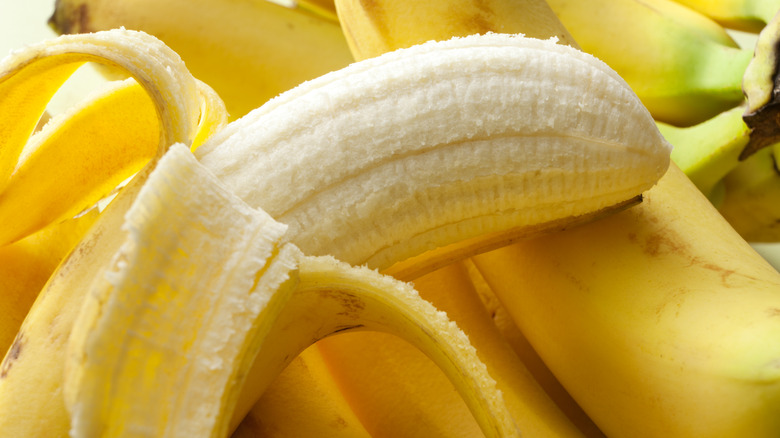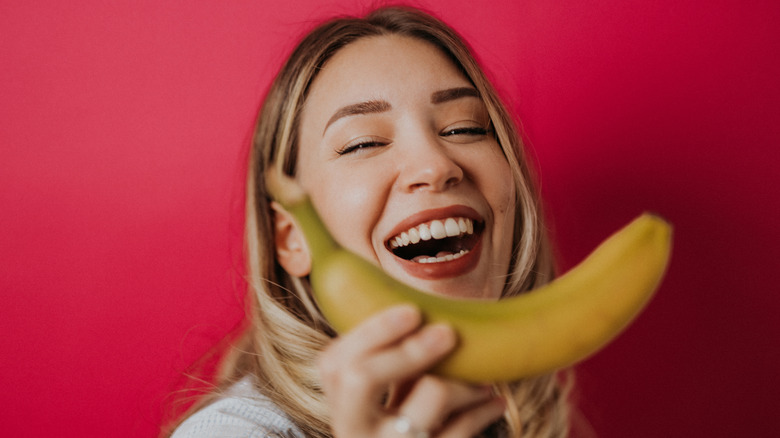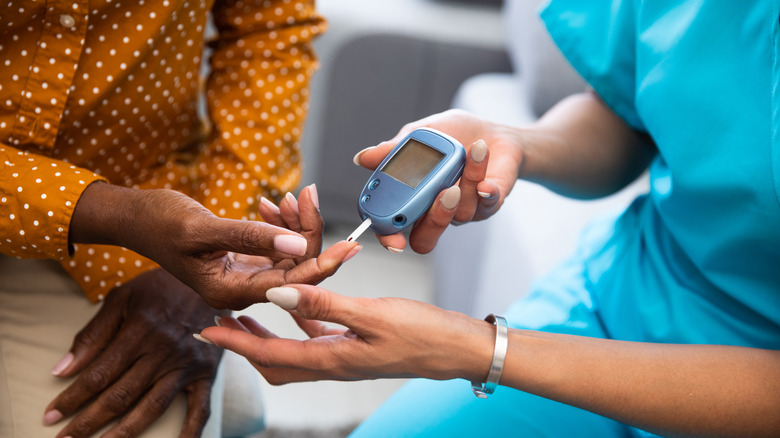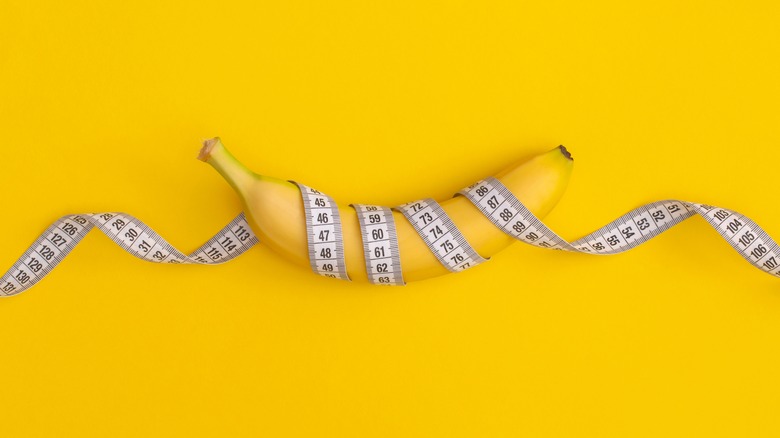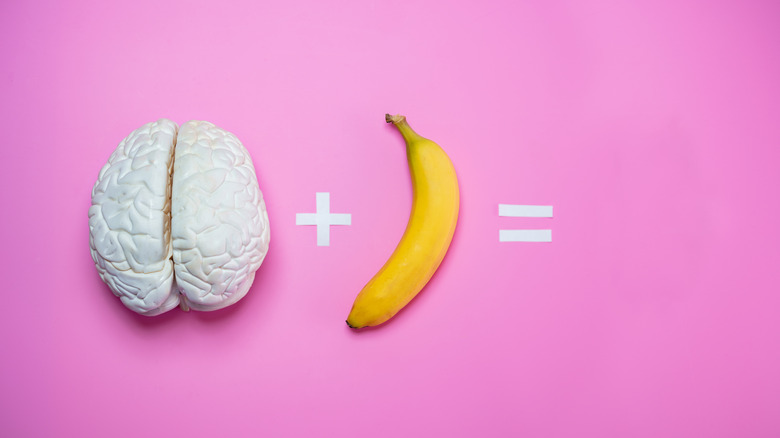This Will Happen To You If You Eat A Banana Every Day
An apple a day keeps the doctor away, as we've all heard, but it's not the only food that could keep the doctor visits at bay. Bananas are more than a versatile fruit — the superfood is loaded with essential vitamins, nutrients, fiber, and natural sugars. By incorporating just one banana into your daily diet, you can support your body's overall health and well-being. This means you don't necessarily have to skip on that banana bread or banana split.
Sure, the sweetness of desserts will probably offset the healthier aspects of the fruit, but we still say more power to you! By adding bananas to your diet, whether you're eating them plain, in dried, chip form, or sliced on top of a smoothie bowl, you'll be doing your body a lot of good.
All we're really trying to say is don't underestimate the power of this simple snack. As a nutritional powerhouse, bananas can aid your heart health, brain function, and digestive system — and that's just the beginning of it. Here, we've gathered several of the ways bananas can help your body on an everyday basis.
You'll get an antioxidant boost
Between the fresh and the actual fruit, bananas are rather rich in antioxidants. This is primarily what classifies them as a superfood — the vitamins and nutrients with antioxidant properties help your body in numerous ways. A study published in Food Science & Nutrition explored the antioxidant properties and anti-cancer potential of banana flesh showed that some main components of a banana's peel give the fruit exponential antioxidant qualities.
Antioxidants are truly amazing because they can help protect cells against degenerative diseases, thereby reducing the risk of cell damage and diseases like cancer. In bananas, these natural antioxidants are found in the phenolic compounds, vitamins, and carotenoids present in the fruit. Vitamin C, for example, is a known antioxidant that can help your cells stay safe from the effects of free radicals.
Essentially, free radicals are unstable molecules that can cause damage to other important molecules in your body. In short, antioxidants can help neutralize those free radicals. According to the USDA, one banana has approximately 11 milligrams of vitamin C, which accounts for about 12% of the daily recommended intake.
Your heart could be protected from disease
It's pretty well known that bananas are chock full of potassium, but did you know that those high potassium levels can potentially help your heart? While too much potassium can have negative effects, a balanced amount in your diet can be beneficial. In a study performed by researchers at the University of Alabama at Birmingham, it was found that reduced levels of aortic stiffness coincided with a potassium-rich diet — in mice. Since aortic stiffness and other vascular issues can be indicative of possible heart disease, these findings helped confirmed the positive effects of potassium on heart function.
While mice and humans are certainly not the same, it is safe to say that having a heart-healthy diet — which can include adding a healthy amount of potassium — can protect your heart in the long run. According to the World Health Organization, most people have more salt in their diets these days and not enough potassium. By increasing your intake of potassium, especially in easy ways like with potassium-rich foods, you can reduce the risk of heart disease, stroke, and more.
You can help lift your mood
Remember how we said bananas have numerous benefits? Well, the way they can help enhance your mood is no exception. First, the body's production of serotonin and dopamine is a main factor in affecting how you feel. Lower levels of these neurotransmitters can result in anxiety, depression, and mood swings. This is where bananas can come in to help and in a pretty cool way.
Bananas are naturally rich in tryptophan, which is a synthetic form of serotonin. A research paper published in Archives of Psychiatric Nursing explained that while our bodies can't make tryptophan, they can recognize it and it'll help increase the rate of serotonin production. This means eating bananas can encourage the body to make more serotonin, thereby improving your mood. Bananas are also high in vitamin B6, which Healthline notes, aids with the conversion of tryptophan to serotonin.
Moreover, a banana has around 3.5 grams of fiber and over triple that in sugars, but when the two are paired, the fiber slows down the amount of sugar going into your blood, which can help keep blood sugar levels even. This can help your mental health because low blood sugar can cause mood swings and irritability. If that weren't impressive enough, bananas also contain prebiotics, which supports digestive health. How are your gut health and mood connected? Studies in Frontiers in Genetics have shown that gut microbiota regulates the brain's development and function and can influence mood states.
You'll support your immune system
Some of the vitamins prevalent in bananas are also great for your immune system. As explained in Nutrients, vitamin C prevents oxidative stress and is known to treat respiratory infections. Learning that vitamin C helps you feel better when you're sick, as well as prevents you from becoming sick, might not be very surprising. After all, we're often told to drink orange juice when we're not feeling too great. Even though bananas might not be the fruit with the most vitamin C, they contain a fair amount of it and might help you feel better.
Likewise, the fruit is high in vitamin B6, which also aids your immune system. According to the Journal of Immunology Research, a deficiency of B6 can be detrimental to the immune system. By supplementing your body short-term with the vitamin, you can help improve your body's immunity to sickness.
Your gut health may improve
Among the many things bananas can do, helping with your gut health is one of them. In general, bananas tend to be pretty easy on the stomach and very few people have an issue digesting them. It also helps that bananas are full of water and fiber, two components that encourage digestion. Per USDA, one average-sized banana has about 94 grams of water and 3 grams of dietary fiber. Bananas are also part of the BRAT diet, which can help if your digestion hasn't been regular. If you haven't heard of it, BRAT stands for bananas, rice, applesauce, and toast.
In an interview with Cleveland Health, Elyse Homan, RD, LD noted that unripe bananas are higher in resistant starch, which can't be digested. "Instead," she said, "it's a prebiotic that promotes the growth of good bacteria in your colon." Homan suggests going slowly with unripe bananas that have that resistant starch because if your body isn't used to eating it, you could initially experience bloating.
You'll help keep your blood sugar in check
In addition to protecting your heart from disease, eating a banana a day can also help regulate your high blood sugar. The fruit may seem somewhat contradictory — after all, bananas are high in carbs and sugar, both of which can cause a spike in blood sugar. But they also contain plenty of dietary fiber, which can combat those carbs and sugars and prevent high blood sugar by slowing down the absorption of the sugar.
Bananas also contain a good amount of magnesium (approximately 34 milligrams), which can help manage blood sugar, especially in those with diabetes. Then we come back to the resistant starch found in unripe bananas. While it can't be digested, resistant starch can act sort of like fiber does as well as help feed the healthy, good bacteria that live in your gut.
Basically, this means that depending on the ripeness of the banana, the fruit can help moderate your blood sugar. If it's very ripe, it'll have more sugar but it'll still have plenty of fiber. If it's green, your blood sugar is likely to stay lower. According to Healthline, bananas are a prime choice for diabetic diets — just remember that it's beneficial to include the fruit as part of a balanced diet.
You'll help your body maintain a healthy weight
A rule of thumb when trying to maintain a healthy weight and diet is to incorporate a balanced amount of fruits, vegetables, and other daily essentials. So it's safe to say that adding a banana to your everyday diet can help.
First, bananas are rather high in nutrients, which means you can get a lot of the recommended intake without having to eat too many different foods. Also, a banana has about 105 calories, much of which is carbs. Yet they contain fewer amounts of fat and protein. With the combination of high fiber and low calories, bananas definitely fit the bill for foods that will fill you up and provide essential nutrients and vitamins.
Your can rejuvenate your body after exercise
You've likely gotten the standard advice to eat a banana when you have a cramp or are done exercising. Maybe you knew this was primarily because of the potassium in bananas, but we're here to explain how it goes beyond that. Besides the high potassium, bananas also have magnesium and calcium, and all three are electrolytes, per WebMD. When you exercise, you lose electrolytes, but you can restore them by putting magnesium and potassium into your body, which can actually help prevent soreness. As magnesium can help your muscles relax, bananas are also a good food to eat when dealing with menstrual cramps.
Aside from the electrolytes bananas offer, they also have a decent amount of carbs. As most athletes will tell you, carbs are beneficial post-workout. During exercise, the glycogen stores in your body work as fuel, and taking in carbs can help replenish your body and prepare you for the next time you work out.
Your blood pressure could improve
Of the many ways bananas are heart-healthy, how they can moderate your blood pressure is a big one. Because high blood pressure (also known as hypertension) can lead to heart attack, stroke, and other severe complications, it's important to keep it in check. According to the CDC, just about half of Americans have hypertension, and only a quarter of them have their high blood pressure under control.
Potassium, one of the major heroes in bananas, can help to lower blood pressure by counterbalancing sodium. Magnesium also has a hand in lowering blood pressure. A 2011 study in The Journal of Clinical Hypertension showed that combining magnesium and potassium and increasing your intake while reducing your intake of sodium has worked better to lower blood pressure than taking a single mineral. The same study showed that the consumption of magnesium can prevent various cardiovascular diseases and complications, such as stroke, coronary heart disease, and cardiac arrhythmias. Since bananas have both magnesium and potassium, it's the perfect food to include in your heart-healthy diet.
You could strengthen your brain's performance
With bananas being a superfood, it makes sense that the fruit would support brain function. In fact, because they include vitamin B6, they are just one of many healthy brain foods you should be eating. It can also boost your mood, prevent and treat anemia, ease PMS symptoms, decrease nausea, and potentially help with Alzheimer's disease.
The calcium found in bananas can also play a role in brain performance. Studies show that calcium helps with long-term processes, such as memory function. In a review in Molecular Neurodegeneration, it sates that, "calcium is fundamental in the control of synaptic activity and memory formation." With 0.55 milligrams of B6 and 6 milligrams of calcium in one banana, it's easy to see how bananas can be incredible for your brain health.

